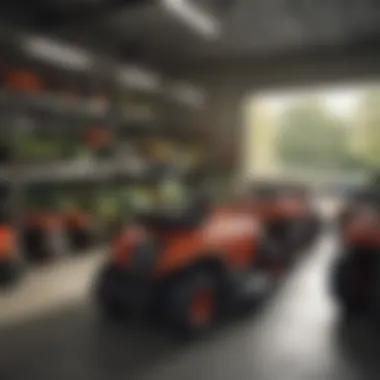Essential Insights on Small Lawn Mower Trailers


Intro
Small lawn mower trailers have become an integral part of landscaping both for professionals and enthusiasts. These trailers are specifically designed to transport lawn mowers and other gardening equipment efficiently. Having such a trailer allows for easier movement and organization of tools, making landscaping tasks more manageable.
In this guide, we will explore various aspects of small lawn mower trailers. From understanding basic terms and concepts to discussing recent innovations and practical applications, this article aims to furnish readers with valuable insights. Understanding how to select, maintain, and utilize these trailers is crucial for anyone serious about their gardening tasks.
Key Concepts and Terminology
Basic Definitions
A small lawn mower trailer is a type of transport equipment that facilitates the movement of lawn mowers, gardening tools, and other related equipment. These trailers come in various designs, capable of accommodating different mower sizes and types. Key features often include foldable sides, a sturdy frame, and sometimes even built-in storage compartments for additional tools.
Historical Context
The concept of lawn mower trailers has evolved over the years. Initially, they were simple carts designed to haul mowers and tools. Over time, advancements in engineering and design principles have led to more sophisticated options. Modern trailers not only provide transport but also enhance the efficiency of work through added features like optimized weight distribution and improved maneuverability.
Recent Innovations and Trends
Technological Advancements
Modern small lawn mower trailers incorporate innovative materials and design techniques. Many are now constructed from lightweight yet durable materials, allowing for increased towing efficiency. Features such as quick-release attachments, adjustable hitches, and enhanced wheel designs have been introduced, making operation easier and safer. Manufacturers are also focusing on making trailers compatible with various mower models to increase usability.
Sustainable Practices
As green practices become more critical in the horticulture industry, manufacturers are adopting sustainable materials and production methods. For instance, some trailers are made from recycled materials. The focus is not just on the trailer's operational efficiency but also on reducing the carbon footprint of gardening practices. This trend resonates with a growing audience that values eco-friendly solutions in their landscaping activities.
Practical Applications and Techniques
Step-by-step Guides
- Selecting the Right Trailer: Consider your specific needs in terms of size and weight capacity. Assess the mowers and tools you plan to haul.
- Maintaining Your Trailer: Regular inspections and maintenance can significantly extend the life of your trailer. Check the tires, brakes, and attachment mechanisms routinely.
- Utilization Tips: Use appropriate straps and securing methods to ensure that mowers and tools remain stable during transit.
Case Studies
In a recent case study, a landscaping business in Texas implemented the use of small lawn mower trailers to enhance service delivery. They reported a 30% increase in efficiency, primarily due to the ease of transporting multiple tools and mowers simultaneously. Such improvements not only bolster productivity but also save on fuel costs.
"Using small lawn mower trailers significantly improved our workflow, making it easier to tackle larger jobs without unnecessary delay."
- Landscape Business Owner, Texas
Through careful selection and maintenance, small lawn mower trailers can transform the way gardening tasks are conducted, offering both practical and functional benefits.
In summary, this guide aims to provide a comprehensive understanding of small lawn mower trailers, highlighting key concepts, innovations, and practical applications that will enhance gardening experiences.
Preamble to Small Lawn Mower Trailers
Small lawn mower trailers represent an essential tool in landscape maintenance and are particularly beneficial for both professional landscapers and gardening enthusiasts. These trailers facilitate efficient transportation of heavy equipment and materials, significantly enhancing productivity in maintaining yards and gardens. Their design often caters specifically to the unique dimensions and weights associated with lawn mowers, allowing for safe and practical use.
The importance of understanding small lawn mower trailers extends beyond mere definitions. Knowing their specifications, varying features, and specific advantages helps in choosing the right model for one’s needs. As landscape management often involves frequent movement of equipment, the right trailer can make tasks more manageable and efficient.
Defining Small Lawn Mower Trailers
Small lawn mower trailers are compact towing structures designed to transport lawn mowers, gardening tools, and other related equipment. Typically built with a frame that supports specific load capacities, these trailers boast dimensions that allow for maneuverability in tight spaces, such as residential yards. Most designs feature a coupling mechanism that attaches them securely to a vehicle, enhancing stability and safety during transport.
Key attributes of small lawn mower trailers include:
- Weight Capacity: Each trailer comes with a specified maximum weight it can carry. This is crucial to avoid overloading, which could lead to accidents or equipment damage.
- Dimensions: The size of the trailer is often tailored for compatibility with smaller mowers, ensuring ease of loading and unloading.
- Material Durability: Many are constructed from steel or lightweight aluminum, providing resilience against wear and tear.
Significance in Landscape Maintenance
The integration of small lawn mower trailers into landscape maintenance routines presents multiple benefits. These trailers provide a convenient means to transport heavy equipment, which can reduce physical strain on individuals maintaining large properties. In addition, the trailers assist in transporting landscaping materials, such as soil, plants, and fertilizer, directly to work sites.
Using small lawn mower trailers helps to streamline operations since it minimizes the time required for multiple trips back and forth. For landscaping businesses, this efficiency translates into higher productivity levels and, ultimately, increased profitability.
"Optimizing transport solutions is key to enhancing overall landscaping efficiency."
Core Features of Small Lawn Mower Trailers


Understanding the core features of small lawn mower trailers is fundamental for anyone involved in landscaping or maintenance. Not only do these features dictate the practicality of the trailer, but they also influence how effectively you can carry out lawn care tasks. Specific elements, such as design considerations and the types of trailers available, play a significant role in ensuring you select the right model for your needs.
Design Considerations
Weight Capacity
The weight capacity of a small lawn mower trailer is crucial. It dictates how much equipment or materials you can transport. A higher weight capacity typically provides more versatility for various tasks. When choosing a trailer, consider what you will be hauling. For instance, if you plan to transport heavier equipment, ensure the trailer's weight limit meets those needs.
One key characteristic of weight capacity is the balance it provides. If the trailer is overloaded, it can lead to instability during transport, making it a safety issue. Thus, understanding the maximum weight limit is beneficial for both safety and efficiency. Overloading a trailer can lead to mechanical failures and could also invalidate warranties, making careful consideration essential.
Dimensions
The dimensions of a small lawn mower trailer affect its maneuverability and storage capacity. A trailer that is too large can be difficult to navigate through tight spaces, while a very small trailer may not have enough room for your equipment.
Key characteristics of dimensions include the length and width of the trailer bed, as well as the height of the trailer from the ground. The right dimensions can maximize space utilization while ensuring that the trailer can be managed easily. A trailer that fits well with your vehicle's towing capacity also offers the benefit of a smoother driving experience.
Material Durability
Material durability is an essential aspect of any lawn mower trailer. The right materials not only add to the trailer's overall strength but also contribute to its longevity. Most small lawn mower trailers are constructed from materials like steel or aluminum.
A key characteristic here is resistance to rust and corrosion. For instance, aluminum trailers typically offer a lighter weight while providing better resistance to the elements. This aspect is beneficial for maintaining the appearance and functionality of a trailer over time. On the downside, lower-cost materials might not withstand heavy use, leading to repairs or replacement sooner than anticipated.
Types of Lawn Mower Trailers
Single Axle Trailers
Single axle trailers are an efficient option for light to moderate jobs. They are narrower and lighter than dual axle versions. This design makes them easier to maneuver in tight areas typical of residential properties.
A notable characteristic is their lower cost, making them a favorable choice for small gardens or occasional use. On the downside, the single axle design may not provide the same level of stability as dual axle trailers when carrying heavier loads, which can affect handling on the road.
Dual Axle Trailers
In contrast, dual axle trailers offer improved stability and weight distribution. They are designed to carry heavier loads due to the support from two axles. This feature makes them highly suitable for frequent use or for transporting larger mowers and equipment.
The primary benefit of dual axle trailers is their increased capacity, which is essential for many landscaping businesses. However, they can be heavier and more challenging to tow, especially for individuals without experience in handling larger trailers.
Utility Trailers
Utility trailers present another versatile option. They are designed to serve multiple functions, combining features from both single and dual axle trailers. Their adaptable designs allow them to carry tools, landscaping materials, and lawn mowers alike.
A prominent characteristic is their customizable features, such as removable side panels or ramps. This flexibility makes utility trailers popular among gardening enthusiasts. However, they might not be as specialized as other trailer types, and this may limit their efficiency in specific tasks.
In summary, understanding the design and types of small lawn mower trailers enhances decision-making for both personal and professional landscaping needs. Each feature adds unique value, and recognizing their implications can lead to better outcomes in lawn maintenance.
Selecting the Right Lawn Mower Trailer
Selecting the right lawn mower trailer is critical for maximizing both efficiency and convenience. An ill-suited trailer can cause unnecessary headaches and insufficient performance. Thus, understanding what to look for is essential. It involves assessing your individual needs and ensuring compatibility with your equipment. Focusing on personal requirements can significantly enhance your overall landscape maintenance efforts.
Assessing Your Needs
Size of Property
The size of your property directly influences your choice of trailer. If you have a larger area to manage, a larger trailer may be more beneficial as it can hold more grass clippings, tools, and other materials. This allows for more extended periods between trips. On the contrary, individuals with smaller lots do not need robust trailers, making a compact one a more suitable choice. Choosing the right size can help in time management and improves the efficiency of your tasks.
Some key characteristics of the property size include:
- Efficiency in Transportation: A properly sized trailer reduces trips back and forth, saving time and effort.
- Cost Performance: Smaller trailers usually cost less, which is attractive for budget-conscious buyers.
Frequency of Use
Next, consider how often you will use the trailer. Regular users might benefit from a more durable and versatile trailer, ensuring it can withstand frequent loading and unloading. In contrast, occasional users may find cheaper, less durable options sufficient. The choice here can impact long-term functionality and expense.
The frequency of use affects several factors:
- Durability Needs: More frequent use means that durability is a priority, influencing the choice of materials and construction quality.
- Maintenance Requirements: If used less often, a simpler design with lower ongoing maintenance needs might be adequate.
Types of Tasks


Lastly, evaluate the types of tasks you plan to perform with the trailer. Some tasks require specific features such as ramp access for easier loading of equipment. Others may necessitate specific weight ratings. Trendy tasks like hauling compact equipment could demand a different setup compared to transporting large equipment.
By understanding types of tasks, you can choose a trailer that meets your specific needs. Here are the core considerations:
- Versatility: A multi-purpose trailer can be advantageous if you engage in varied tasks.
- Specific Design Features: Knowing your tasks can lead to optimal features, such as fold-down ramps or enhanced towing capacity.
Evaluating Compatibility with Mowers
Coupling Mechanism
The coupling mechanism is a vital aspect to consider for ensuring a stable connection between your mower and trailer. This mechanism needs to be compatible with your mower model. Poor compatibility can lead to operational issues and potential damages. Understanding the variety of coupling systems available can simplify your choice.
Key attributes include:
- Ease of Attachment: A user-friendly system makes loading and unloading much quicker.
- Safety Desired: A secure coupling mechanism prevents accidents, increasing overall safety when transporting loads.
Weight Alignment
Proper weight alignment between the lawn mower and the trailer is crucial. When the weight is not distributed evenly, it can create handling issues while driving. This lack of balance can lead to difficulties in steering on tricky terrain.
Consider the following about weight alignment:
- Transport Stability: Proper weight supports better stability and handling while on the road.
- Potential Damage Reduction: A balanced load reduces strain on both the mower and trailer, extending their lifetimes.
Stability During Transport
Finally, consider stability during transport. A stable trailer minimizes the risk of swaying and ultimately contributes to better driving performance. Several features enhance stability, such as low-profile designs and double-axle systems. Understanding your trailer's stability will play a significant role in providing comfort and security on the road.
Stability characteristics include:
- Risk Management: Reduced sway during transport lowers the chance of accidents.
- User Comfort: A stable connection means less worry and a more relaxed driving experience.
Choosing the right lawn mower trailer can greatly enhance the efficiency and ease of landscaping tasks. Take your time in assessing needs and compatibility for optimal results.
Maintenance of Small Lawn Mower Trailers
Maintaining small lawn mower trailers is crucial for ensuring their longevity and performance. Routine maintenance not only prevents unexpected breakdowns but also preserves the value of your investment. Proper upkeep can enhance safety, efficiency, and effectiveness during regular landscaping tasks. Failing to maintain trailers can lead to expensive repairs and safety hazards. Thus, having a maintenance schedule is essential for both seasoned professionals and casual gardeners.
Routine Inspection Procedures
Routine inspections can identify potential issues before they escalate. Regular checks keep your trailer operating smoothly and safely. Below are some key areas of focus during your inspection procedures.
Tire Pressure Checks
Tire pressure checks are essential for optimal performance. Maintaining the correct pressure improves traction and fuel efficiency. A key characteristic of this practice is its simplicity; checking tire pressure requires minimal tools and can be done quickly. It is a beneficial choice for ensuring safe transport of equipment and reducing wear and tear on the tires.
One unique feature of tire pressure maintenance is its impact on braking distance. Correctly inflated tires promote even contact with the ground, enhancing braking efficiency. If tires are under-inflated, it risks increasing stopping distances and could lead to accidents in transport.
Brake Functionality
Brake functionality is critical for safety during transport. Regular checks ensure that brakes respond appropriately and do not overheat during use. A vital characteristic of brake functionality is the reliability it provides. Properly functioning brakes allow for safer handling of the trailer, especially when loaded.
The unique advantage of regular brake checks is the potential to identify issues before they lead to catastrophic failures. For instance, worn brake pads can be replaced early, preventing damage to the braking system.
Frame Integrity
Frame integrity is another vital aspect of maintenance. Inspecting for cracks or rust on the trailer's frame can help prevent major structural failures. The key characteristic of frame checks is their impact on overall safety and performance. A well-maintained frame can withstand heavy loads and rough terrains, which is beneficial for both frequent users and those who use trailers occasionally.
The unique benefit of ensuring frame integrity is the preservation of load stability. A compromised frame may not bear weight evenly, which can lead to loss of control while driving. Thus, consistently checking the frame can save money and enhance safety.
Cleaning and Care Tips
Besides inspections, proper cleaning and care play an integral role in trailer maintenance. Regular cleaning prevents dirt buildup and can prolong the lifespan of various parts.
Surface Cleaning


Surface cleaning is important for aesthetic and functional reasons. Regular washdowns remove dirt and debris that could lead to rust or other forms of damage. The key characteristic of this practice is its simplicity; it requires minimal equipment and can easily be incorporated into routine care.
A unique advantage of regular surface cleaning is the ability to identify issues such as scratches or areas in need of touch-up paint, thereby preserving the trailer's appearance and value over time.
Rust Prevention Measures
Rust prevention measures are crucial for enhancing a trailer's durability. Applying protective coatings or paint can keep rust at bay. A key characteristic of these measures is their long-term benefits; investing time and resources into rust prevention can extend the trailer's operational lifespan.
One unique advantage is that rust prevention not only keeps the trailer functional but also enhances its resale value. A trailer with minimal rust will always command a higher price on the market when it’s time to sell or trade-in.
Storage Recommendations
Proper storage recommendations can significantly prolong the life of your lawn mower trailer. Keeping the trailer in a sheltered area protects it from harsh weather conditions. The key characteristic of effective storage is its impact on wear and tear; trailers in optimal storage conditions will generally last longer.
A unique feature of appropriate storage is the potential for organization. Keeping tools and equipment in the same storage area minimizes the time spent looking for items needed for lawn care, enhancing productivity.
"Regular maintenance of your small lawn mower trailer not only prolongs its lifespan but also enhances safety during use."
Through diligent maintenance practices, owners can ensure their small lawn mower trailers function effectively and retain their value. The combination of routine inspections, thorough cleaning, and proper storage introduces a proactive approach to trailer management. This strategic method supports not only individual needs but also contributes to a safer landscaping experience.
Cost Considerations for Small Lawn Mower Trailers
When investing in small lawn mower trailers, understanding the costs involved is vital. Not only does the price of the trailer affect your budget, but it also plays a critical role in determining the utility and longevity of the equipment. Cost considerations encompass the initial purchase price, potential upgrades, ongoing maintenance, and any additional accessories that may enhance performance. By assessing these factors, buyers can make informed decisions that align with their landscaping needs and financial capabilities.
Initial Investment vs Long-term Benefits
The initial investment in a lawn mower trailer often reflects its quality and functionality. High-quality trailers may cost more upfront, but they frequently offer better durability and features that lead to long-term advantages. For example, a trailer constructed from robust materials will resist wear over time, saving money on replacements or repairs.
Additionally, consider how the trailer fits into your overall landscaping routine. A more expensive trailer may provide efficiency benefits by handling larger loads or facilitating faster transport. Thus, the long-term benefits can outweigh the initial costs when weighed against their impact on productivity.
Budgeting for Additional Features
Upgrades
Upgrading a lawn mower trailer can significantly enhance its performance. Features such as advanced braking systems or higher weight capacities contribute to better handling and safety. Upgrades are often sought after because they customize trailers for specific tasks or improve existing capabilities. The main key characteristic of upgrades is that they often extend the functional life of the trailer. However, it is crucial to balance price against utility; some upgrades may not be necessary depending on the user's needs. Ultimately, investing in the right upgrades can be a smart choice, but assessing your requirements is essential.
Maintenance Costs
Ongoing maintenance costs are an often-overlooked aspect when considering the overall cost of a lawn mower trailer. These expenses include regular inspections, part replacements, and repairs. It is important to budget systematically for these costs, as neglecting maintenance can lead to bigger issues and higher expenses down the line. A key characteristic of maintenance costs is the potential for savings when routine checks prevent significant failures. While they can seem burdensome at first, committing to a maintenance regimen can enhance safety and prolong the trailer’s lifespan.
Accessory Purchases
Accessories for lawn mower trailers can also contribute to overall functionality. Items such as tie-down straps, ramps, or tool holders enhance the usability of the trailer. Investing in these accessories can ensure that the trailer operates efficiently and meets your specific needs. The main characteristic of accessories is their ability to adapt the trailer to different situations, making them a beneficial addition. However, it is important to consider that not every accessory is necessary for all users. Identifying which products will actually improve usage is key to effective budgeting.
"When considering lawn mower trailers, assess all cost factors to ensure a wise investment for your landscaping tasks."
End and Recommendations
In reviewing the topic of small lawn mower trailers, it is crucial to synthesize the insights gained throughout this guide. The overarching relevance of these trailers in both residential and commercial landscaping efforts cannot be overstated. They provide a practical solution for the transportation of lawn care equipment and materials, optimizing efficiency in maintenance tasks. Recognizing the importance of this utility, we should focus on the key elements outlined in the previous sections and their benefits.
One prominent aspect is the choice of trailer type, which should be aligned with individual or business needs. For instance, single axle trailers offer great maneuverability, while dual axle models provide greater stability. Understanding which type best suits specific tasks can significantly impact operation and efficiency. Additionally, assessing the weight capacity and dimensions ensures that the selected trailer complements the mower and other tools correctly.
Furthermore, maintenance is imperative for trailer longevity and safety. Regular inspections and adherence to cleaning guidelines must be prioritized. This not only prolongs the lifespan of the equipment but also reduces the risk of mishaps during transport.
"The right lawn mower trailer enhances productivity, making landscape maintenance less cumbersome."
Budget considerations should also enter into the decision-making meld. While the initial investment may vary, attention to potential long-term benefits can offer a favorable return in efficiency and operation cost savings. Budgeting for future upgrades and accessories can be equally important in ensuring that the trailer meets evolving needs in lawn care operations.
Lastly, it's essential to remain informed about the latest developments in trailer technology and design features. This knowledge allows users to make informed choices that align with the advancements in lawn care practices.
Recap of Key Insights
The comprehensive analysis of small lawn mower trailers highlights several vital elements:
- Utility: Small lawn mower trailers streamline the process of transporting equipment and materials.
- Selection Factors: Consideration of property size, frequency of use, and task types will greatly influence trailer choice.
- Types: Different trailers, such as single and dual axle, serve distinct purposes and offer varying capabilities.
- Maintenance: Regular checks and proactive maintenance practices are key to ensuring longevity and functionality.
- Cost Efficiency: Initial costs represent only part of the total financial picture; long-term savings should be a focal point.
Each of these insights contributes to a more profound understanding of the role of small lawn mower trailers in landscape management.
Final Thoughts on Usage and Selection
Understanding the distinctions between trailer types and their capabilities helps optimize transport efficiency. Moreover, cultivating a habit of routine maintenance will safeguard investments over time.
As technologies evolve, maintaining an awareness of new features can enhance the operation and utility of lawn mower trailers. This proactive approach leads to improved effectiveness in lawn care, ultimately simplifying what can often be labor-intensive tasks. Therefore, engage with this information as a guiding framework for selecting the right trailer that aligns best with your horticultural ambitions.















